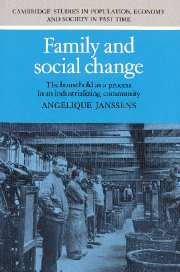Book contents
- Frontmatter
- Contents
- List of figures
- List of tables
- List of appendices
- Preface
- 1 Family and industrialization
- 2 The industrializing context: continuity and change in nineteenth-century Tilburg
- 3 Sources and methods
- 4 Family structure through time
- 5 Family life and the social structure
- 6 Family structure and geographical mobility
- 7 Family and work: the effect of the family economy on the structural characteristics of the household
- 8 Conclusion
- Appendices
- Bibliography
- Index
- Cambridge Studies in Population, Economy and Society in Past Time
Preface
Published online by Cambridge University Press: 05 March 2012
- Frontmatter
- Contents
- List of figures
- List of tables
- List of appendices
- Preface
- 1 Family and industrialization
- 2 The industrializing context: continuity and change in nineteenth-century Tilburg
- 3 Sources and methods
- 4 Family structure through time
- 5 Family life and the social structure
- 6 Family structure and geographical mobility
- 7 Family and work: the effect of the family economy on the structural characteristics of the household
- 8 Conclusion
- Appendices
- Bibliography
- Index
- Cambridge Studies in Population, Economy and Society in Past Time
Summary
Until recently, the field of family history was heavily dominated by work on the British, French or American family. In the last few years other countries, for instance in the south or east of Europe or even Asia, are speedily catching up with the pioneers. The Netherlands, however, appear to be suffering from a persistent time lag in the study of the family and the household. This is regrettable when we consider its regional variety in social, economic and cultural development combined with the exceptional richness of its sources. In particular, the population registers, which were in use in The Netherlands from 1849 onwards, are of great value to the historian of the family. These registers allow us to observe households and families, even those belonging to the poorest section of the population, on a day-to-day basis over long time spans. They therefore allow the historian to meet the widely proclaimed requirement of a longitudinal perspective on family and household. However, the registers not only provide vital demographic information but when combined with additional sources they also yield a wealth of social and economic data on individuals and families.
This study is a first attempt to analyze the structure and composition of the household during industrialization in the Netherlands from the population registers. It attempts to provide an insight into the effect of macro-level changes on micro-level processes involving the family.
- Type
- Chapter
- Information
- Family and Social ChangeThe Household as a Process in an Industrializing Community, pp. xxi - xxiiPublisher: Cambridge University PressPrint publication year: 1993

